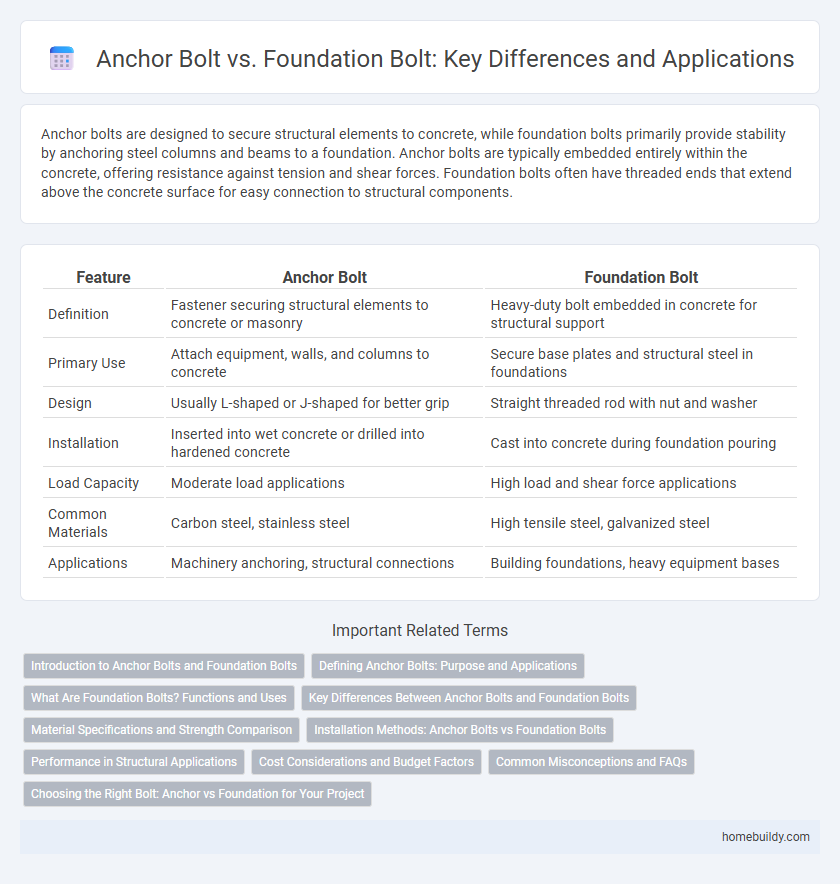Anchor bolts are designed to secure structural elements to concrete, while foundation bolts primarily provide stability by anchoring steel columns and beams to a foundation. Anchor bolts are typically embedded entirely within the concrete, offering resistance against tension and shear forces. Foundation bolts often have threaded ends that extend above the concrete surface for easy connection to structural components.
Table of Comparison
| Feature | Anchor Bolt | Foundation Bolt |
|---|---|---|
| Definition | Fastener securing structural elements to concrete or masonry | Heavy-duty bolt embedded in concrete for structural support |
| Primary Use | Attach equipment, walls, and columns to concrete | Secure base plates and structural steel in foundations |
| Design | Usually L-shaped or J-shaped for better grip | Straight threaded rod with nut and washer |
| Installation | Inserted into wet concrete or drilled into hardened concrete | Cast into concrete during foundation pouring |
| Load Capacity | Moderate load applications | High load and shear force applications |
| Common Materials | Carbon steel, stainless steel | High tensile steel, galvanized steel |
| Applications | Machinery anchoring, structural connections | Building foundations, heavy equipment bases |
Introduction to Anchor Bolts and Foundation Bolts
Anchor bolts are specialized fasteners designed to securely attach structural elements to concrete, ensuring stability and load transfer in construction projects. Foundation bolts function similarly but are specifically embedded deep into the foundation to resist shear and tension forces from structural loads. Both anchor bolts and foundation bolts play critical roles in reinforcing the integrity of buildings and infrastructure by providing reliable connection points between steel components and concrete foundations.
Defining Anchor Bolts: Purpose and Applications
Anchor bolts are specialized fasteners designed to secure structural elements to concrete, providing stability and resistance to shear and tension forces. Commonly used in construction, they attach steel columns, light poles, and heavy machinery to foundation slabs, ensuring safety and durability. Unlike foundation bolts, which primarily anchor base plates and distribute loads, anchor bolts focus on maintaining the precise positioning of structural components under dynamic and static conditions.
What Are Foundation Bolts? Functions and Uses
Foundation bolts are heavy-duty fasteners embedded into concrete foundations to secure structural elements or machinery in place, providing stability and resistance to dynamic forces. They function by anchoring steel columns, beams, or equipment, ensuring alignment and preventing movement due to wind, seismic activity, or vibration. Commonly used in construction and industrial applications, foundation bolts are essential for maintaining the integrity and safety of buildings and heavy machinery installations.
Key Differences Between Anchor Bolts and Foundation Bolts
Anchor bolts are fasteners embedded in concrete to secure structural elements, designed primarily for shear and tensile loads, while foundation bolts often refer to a broader category used specifically for securing machinery or equipment to a foundation. Anchor bolts typically have a hooked or bent end for enhanced concrete grip, whereas foundation bolts may be straight and rely on additional anchoring methods. Material strength, installation methods, and application purposes distinguish anchor bolts from foundation bolts in construction projects.
Material Specifications and Strength Comparison
Anchor bolts typically utilize high-strength carbon steel or stainless steel conforming to ASTM A307 or A449 standards, ensuring durability and corrosion resistance in structural applications. Foundation bolts often require ASTM F1554 grades 36, 55, or 105, which provide higher tensile strength and improved load-bearing capacity for heavy foundation anchoring. Comparing material specifications, foundation bolts exhibit superior mechanical strength, making them suitable for critical load scenarios, whereas anchor bolts balance strength with flexibility for general fastening purposes.
Installation Methods: Anchor Bolts vs Foundation Bolts
Anchor bolts are typically installed by embedding them directly into concrete before it sets, ensuring precise alignment and stability for structural connections, while foundation bolts are often pre-installed or cast-in-place within the foundation, designed to secure structural elements by anchoring into the base material. Installation of anchor bolts requires careful positioning and may involve templates to maintain spacing and depth, whereas foundation bolts installation focuses on reinforcement integration and load distribution within the foundation. Both methods demand accurate placement to achieve optimal performance, but anchor bolts emphasize easy adjustment during assembly, contrasting with foundation bolts' integration for foundational strength.
Performance in Structural Applications
Anchor bolts and foundation bolts differ in performance characteristics crucial for structural applications, with anchor bolts offering superior resistance to shear and tensile forces due to their embedded design and material strength. Foundation bolts primarily serve to secure structural elements to concrete bases but may lack the enhanced load-bearing capacity and corrosion resistance found in high-grade anchor bolts. Choosing the appropriate bolt depends on specific load requirements, environmental conditions, and the structural integrity needed for long-term stability.
Cost Considerations and Budget Factors
Anchor bolts typically offer a more cost-effective solution compared to foundation bolts due to simpler manufacturing processes and easier installation. Budget factors often prioritize anchor bolts in projects where lower upfront material and labor costs are critical. Foundation bolts, while more expensive, may require higher budgets for stronger load-bearing needs and complex seismic requirements.
Common Misconceptions and FAQs
Anchor bolts are often confused with foundation bolts, though they serve distinct purposes in structural applications. Anchor bolts primarily secure structural elements to concrete, while foundation bolts fasten structures directly to the foundation, typically embedded in concrete for stability. Common misconceptions include assuming both can be used interchangeably and misunderstanding their load-bearing capacities; FAQs often address installation methods, material types, and proper usage to ensure structural integrity.
Choosing the Right Bolt: Anchor vs Foundation for Your Project
Choosing the right bolt between anchor bolts and foundation bolts depends on the specific structural requirements and load conditions of your project. Anchor bolts are primarily designed for securing structural elements to concrete, offering high corrosion resistance and precise embedment for stability. Foundation bolts provide enhanced strength for heavy-duty applications, accommodating larger loads and dynamic forces often encountered in industrial or seismic zones.
Anchor bolt vs Foundation bolt Infographic

 homebuildy.com
homebuildy.com